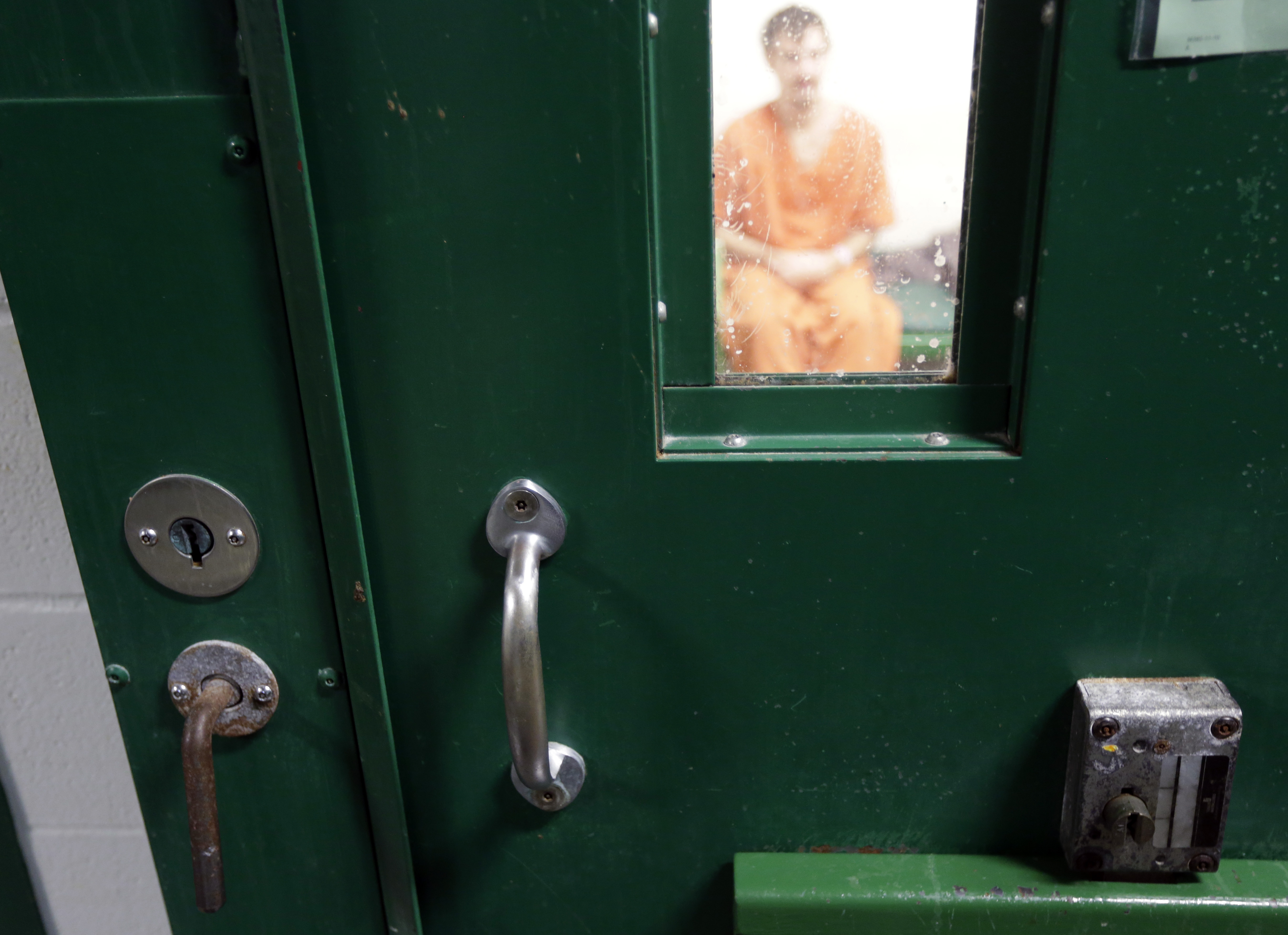The evidence is in: Solitary confinement is unconstitutional torture
New research proves what we already know: Long stretches of isolation will make a man go mad


A free daily email with the biggest news stories of the day – and the best features from TheWeek.com
You are now subscribed
Your newsletter sign-up was successful
When I served in the Peace Corps, I worked as a teacher in a remote South African village. When the teachers' union declared a strike that lasted for almost four weeks in 2010, most of the teachers cleared out to stay with family closer to town, there being little reason besides the school for the village to exist in the first place.
I was left with nothing to do and almost no one to talk to. I did have electricity and internet, so I spent hours reading and writing, and hours more wandering around the bush, listening to audiobooks. It was sort of nice, for a while. But after spending a couple weeks without speaking a single word to anyone, I began to feel unhinged. My thoughts looped endlessly; concentrating on reading became difficult. When I met up with some fellow volunteers in town for some company, I was disturbed to find myself behaving oddly, compulsively babbling about the hundreds of blog posts I had read in the preceding weeks (and I wasn't the only one). It was worse to discover that I almost couldn't stop myself — I seemed to have lost the knack of interacting with others.
Of course, the effect wasn't permanent, and I felt at least passably normal after a few hours. It did lead to one thought, however: Suppose it hadn't been just a few weeks of limited isolation with hundreds of books, total freedom of movement, and an internet connection? Suppose I had been locked in a tiny concrete box with few or no diversions for months on end? Or even 43 straight years, like Albert Woodfox? I am convinced I would have totally lost my mind.
The Week
Escape your echo chamber. Get the facts behind the news, plus analysis from multiple perspectives.

Sign up for The Week's Free Newsletters
From our morning news briefing to a weekly Good News Newsletter, get the best of The Week delivered directly to your inbox.
From our morning news briefing to a weekly Good News Newsletter, get the best of The Week delivered directly to your inbox.
I thought of those days reading a recent legal report on long-term (as in, years-long) solitary confinement. The evidence is unequivocal: Solitary confinement is unconstitutional torture. It should be immediately abolished.
The report is by psychology and law professor Craig Haney from University of California, Santa Cruz, entered as expert evidence for an ongoing lawsuit against solitary imprisonment practices in California. It makes for grim reading. Many of his subjects have been in solitary for years on end, and some for decades. They have been cruelly harmed.
The scientific literature on isolation, as well as my own research and experience, indicate that "long-term" exposure to precisely the kinds of conditions and practices that — based on the extensive number of documents that I have reviewed and many prisoner interviews I now have conducted — clearly currently exist in the [Pelican Bay solitary unit] and clearly place prisoners at grave risk of psychological harm. This is true whether or not those prisoners suffer from a preexisting mental illness. [Craig Haney]
Haney also notes that the "long-term" cases in the social science literature include solitary stints that last four weeks — not just years or decades.
Why is solitary so bad? Put simply, human beings depend quite helplessly on social interaction to thrive normally. Humans, like most primates, live in groups, and derive great benefits from doing so. Strong social bonds underpin systems of mutual support and trust, and enable the division of labor.
A free daily email with the biggest news stories of the day – and the best features from TheWeek.com
From an evolutionary perspective, there is often not much difference between deriving a great benefit from something and needing it to survive. When oxygen first appeared in Earth's atmosphere, it was a corrosive poison. Yet soon new organisms adapted to the conditions, and learned to use the gas for their own benefit. Soon they would die without it.
Most solitary cells make the situation worse by depriving the inmate of nearly all stimulation. They are universally tiny, brutalist, and bland. Many have no windows. Books are usually limited if not forbidden.
So it's not remotely surprising that solitary prisoners account for a hugely disproportionate number of psychological illnesses in prison. Prisoners in solitary are "only" 3 to 8 percent of the prison population, but account for half the suicides. As Charles Dickens easily grasped in 1842, prolonged solitary is likely worse torture than flogging — which would undoubtedly be considered unconstitutional under the Eighth Amendment.
Moreover, it is simply unnecessary (not to mention hugely expensive). One does not need to endorse the incomprehensible gentleness of Norwegian prisons to see this. As Atul Gawande points out, in Britain they have virtually abolished solitary, replacing it with closely supervised small units with some opportunities and diversions for the most hardcore prisoners. Both costs and prison violence dropped.
An anti-solitary movement appears to be slowly gaining steam. It's an uphill battle against a manic fixation with security, annoyance at inconvenient inmates, and total disregard for prisoner rights. The last hurdle will be the biggest one, I suspect, because most inmates in solitary have been convicted of serious crimes. But even they have rights — it's right there in the Constitution.
Ryan Cooper is a national correspondent at TheWeek.com. His work has appeared in the Washington Monthly, The New Republic, and the Washington Post.
-
 Why the Bangladesh election is one to watch
Why the Bangladesh election is one to watchThe Explainer Opposition party has claimed the void left by Sheikh Hasina’s Awami League but Islamist party could yet have a say
-
 The world’s most romantic hotels
The world’s most romantic hotelsThe Week Recommends Treetop hideaways, secluded villas and a woodland cabin – perfect settings for Valentine’s Day
-
 Democrats push for ICE accountability
Democrats push for ICE accountabilityFeature U.S. citizens shot and violently detained by immigration agents testify at Capitol Hill hearing
-
 19 Kids and Counting's Josh Duggar hit with child pornography charges
19 Kids and Counting's Josh Duggar hit with child pornography chargesSpeed Read
-
 Matt Gaetz was the main opponent of Florida's nonconsensual 'revenge porn' law, GOP lawmaker says
Matt Gaetz was the main opponent of Florida's nonconsensual 'revenge porn' law, GOP lawmaker saysSpeed Read
-
 Georgia police arrest Black lawmaker for knocking as Gov. Brian Kemp signed new voting restrictions
Georgia police arrest Black lawmaker for knocking as Gov. Brian Kemp signed new voting restrictionsSpeed Read
-
 Myanmar junta reportedly kills 38 protesters, declares martial law in part of Yangon
Myanmar junta reportedly kills 38 protesters, declares martial law in part of YangonSpeed Read
-
 Raskin asks FBI for answers on how it's targeting white supremacists in law enforcement
Raskin asks FBI for answers on how it's targeting white supremacists in law enforcementSpeed Read
-
 Ahmaud Arbery's mother files civil rights lawsuit 1 year after his death
Ahmaud Arbery's mother files civil rights lawsuit 1 year after his deathSpeed Read
-
 Lawyer for man charged in Capitol riot says he worked for the FBI, had top-secret security clearance
Lawyer for man charged in Capitol riot says he worked for the FBI, had top-secret security clearanceSpeed Read
-
 Trump's impeachment lawyer specializes in medical malpractice and 'people falsely accused in Me Too cases'
Trump's impeachment lawyer specializes in medical malpractice and 'people falsely accused in Me Too cases'Speed Read
